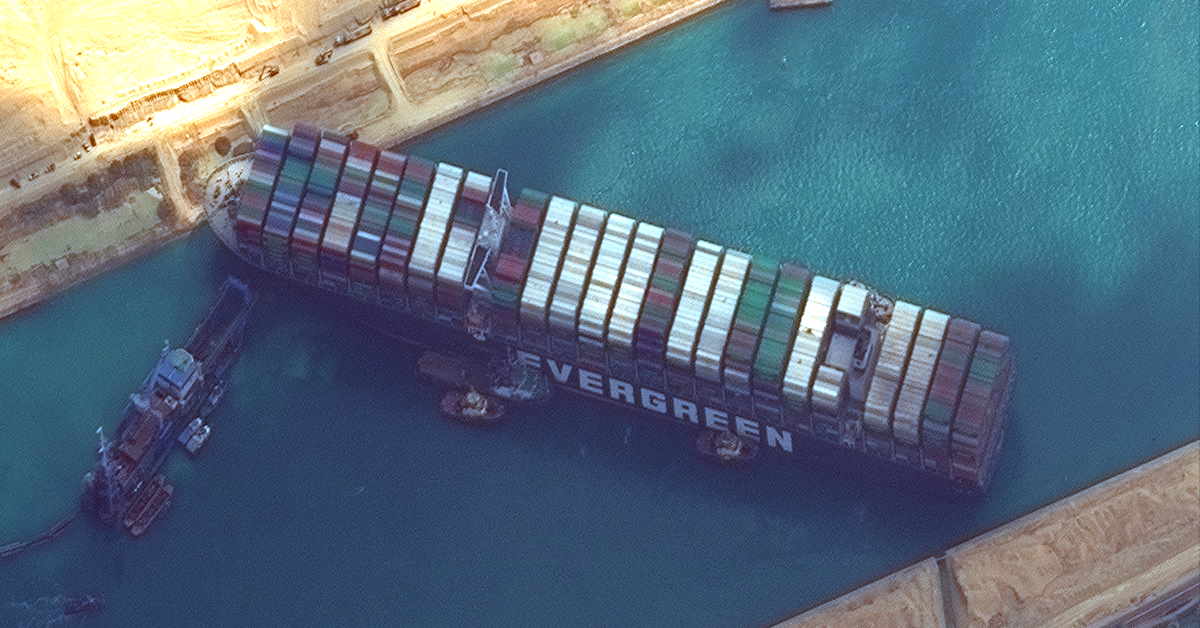A giant container ship, almost as long as New York's Empire State Building is high, got stuck during a sandstorm Tuesday in Egypt's Suez Canal, causing a traffic jam of cargo ships through one of the world's busiest shipping lanes.
Here is what we know so far:
What Happened?
The 400-metre (1,300-foot) long, 200,000-tonne MV Ever Given, from the class of so-called "megaships", veered off course in the canal while a gale-force dust storm hit Egypt's Sinai Desert and much of the Middle East.
The 59-metre (195-foot) wide Taiwan-run, Panama-flagged vessel became stuck at about 0540 GMT near the southern end of the canal and diagonally blocked the man-made waterway between the Mediterranean and the Red Sea.
Ship operator Evergreen Marine Corp of Taiwan said the vessel – which was en route from Yantian, China to the Dutch port of Rotterdam – "ran aground after a suspected gust of wind hit it".
The Suez Canal Authority (SCA) said the accident was "mainly due to the lack of visibility due to the weather conditions when winds reached 40 knots, which affected the control" of the ship.
The 25 crew are unhurt, the hull and cargo undamaged, and there is no oil leak, said the vessel's managers, Singapore-based Bernhard Schulte Shipmanagement (BSM).
Egyptian tug boats, dredgers and bulldozers are trying to free the enormous ship.
What's The Impact?
The megaship blocks the shipping artery through which more than 10 percent of global maritime trade passes, much of it consisting of oil and grains.
The Suez Canal, opened in 1869 and widened since, is a crucial shortcut between Asia and Europe that saves ships from having to navigate around Africa.
As a result of the accident, more than 100 vessels are forced to wait at either end of the canal or midway, at Egypt's Great Bitter Lake, said canal service provider, Leth Agencies.
Old sections of the canal have been reopened to ease the congestion – but this doesn't solve the fundamental problem, as there is only one lane on the southern end where the ship is stuck.
The blockage of the global trade chokepoint has hit world oil markets, as traders anticipated delays in deliveries.
Crude futures surged six percent on Wednesday. But prices tumbled on Thursday due to nagging pandemic concerns and inflation fears, wiping out those gains.
"We've never seen anything like it before," said Ranjith Raja, Middle East oil and shipping researcher at international financial data firm Refinitiv.
"It is likely that the congestion... will take several days or weeks to sort out as it will have a knock-on effect on other convoys."
Lloyd's List, a shipping data and news company, said companies are being forced to consider "taking the far longer route around the Cape of Good Hope to get to Europe or the east coast of North America", a diversion that takes an additional 12 days.
Shipping expert Rose George said on Friday the blockage was certain to cause price increases for consumers around the world.
What Happens Next?
Egyptian authorities have deployed eight additional tugboats to free the stricken ship.
Peter Berdowski, CEO of Boskalis, the parent company of Dutch salvage firm Smit Salvage, which has sent a team, said the complex operation could last days or even weeks.
He equates the massive vessel to "a heavy whale on the beach".
Crews were seen working through the night into Friday, using a large dredging machine under floodlights.
The megaship's owner, Japanese ship-leasing firm Shoei Kisen Kaisha, said that "tugboats and dredgers are being used to crush rocks" to try to dislodge the boat.
Another attempt to re-float the vessel failed early Friday, BSM said.
"The focus is now on dredging to remove sand and mud from around the port side of the vessel's bow," explained BSM, adding that "two additional tugs" will be arriving on Sunday to assist.
The canal authority said between 15,000 and 20,000 cubic metres of sand would have to be removed in order to reach a depth of 12-16 metres and re-float the ship.
If those efforts fail, salvage teams will look to unload some of the Ever Given's cargo and take advantage of a spring high tide to move the vessel. – AFP
